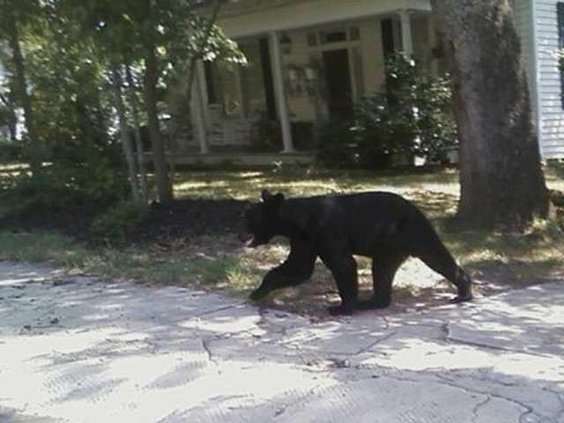A bear sighting is often something considered when hiking in the wilderness, but wildlife biologists say those encounters could become more prevalent in Northeast Georgia suburbs.
Black bears could soon be permanent residents of Gainesville and surrounding areas including North Atlanta's suburbs.
"All of North Georgia has seen an increase in a very healthy, thriving bear population and that's certainly true around Gainesville and all of the mountains around North Georgia," said Adam Hammond, wildlife biologist and bear project leader with the Georgia Department of Natural Resources.
The animals could be reproducing well inside the Atlanta metro area within the next decade, which would mean a new way of life for suburban residents not accustomed to living in bear country, experts say.
"Certainly we have an increasing bear population and more and more opportunity for those human-bear conflicts," Hammond said.
North Georgia's bear population, which extends south from the mountains into areas near Cumming, appears to be growing and the animals are competing for territory, said Don McGowan, a wildlife biologist with the Georgia Department of Natural Resources.
Hammond said the presence of bears hasn't necessarily been a problem, and it's actually common for them to creep into suburban areas this time of year.
"If you're in Gainesville, you probably deal with bears pretty often as far as bears getting on people's decks," he said. "Certainly bears take advantage of easy and free food. ... We normally have problems when natural foods are limited early in the summer or late in the summer just before acorns become available."
Drought conditions this summer could have led to the increasing population, Hammond added.
"This year was a little bit heightened. I think the drought may have impacted some of those natural foods," he said. "We had a pretty normal summer until about August, and then it sort of broke loose and things were pretty crazy there for the month of August."
Researchers say bears are expanding their range nationwide, and are being seen in metro areas such as Birmingham, Ala., and Tulsa, Okla.
"Overall, bears are expanding pretty much everywhere," said Eric Hellgren, director of the Cooperative Wildlife Research Laboratory at Southern Illinois University-Carbondale.
"In most states, they're either stable or they're increasing," he said. "And if they're increasing, that generally means they're going to start coming into contact with people more often and that's certainly a nationwide issue."
Hellgren said the U.S. bear population has boomed as hunting declined. Though hunting black bears is still legal in many places "the hunting hasn't been adequate to drive the population down."
The total U.S. bear population more than doubled between 1989 and 2006, rising to more than 350,000 from 165,000, the nonprofit International Association of Bear Research and Management found when it studied the issue.
Estimating the number of bears in specific areas is difficult, Hellgren said. But it's clear they've thrived in much of the South, including the Blue Ridge Mountains and the Ozarks.
As bears move into urban areas, Hammond said residents will have to adapt and perhaps change the way they store garbage and where they place bird feeders.
"When people aren't careful and don't store their trash properly or they feed their pets in such a way the bears can have access to that pet food or the same thing with bird feeders — if these things are available, bears take advantage of them obviously," Hammond said.
In suburban areas, homes and businesses might have to use bear-proof trash receptacles like the ones already in place in the Chattahoochee River National Recreation Area.
The concern with the bear population moving into urban areas is that they could grow accustomed to being around people and will no longer fear their presence.
"It can be problematic because they lose their fear of people and basically it's not good for the bears, it's not good for the people," Hammond said. "It just creates a little more difficult situation to manage as far as trying to keep bears wild."
The booming population of metro Atlanta's northern suburbs might entice black bears to become neighbors.
The animals are highly adaptable, "so a high population center like the metro area is not necessarily a deterrent to bears expanding," McGowan said.
"In fact, it may be conducive in some respects because of food sources," he said. "They may live a pretty good life in these areas if they can dodge all the cars."
Associated Press contributed to this report.

